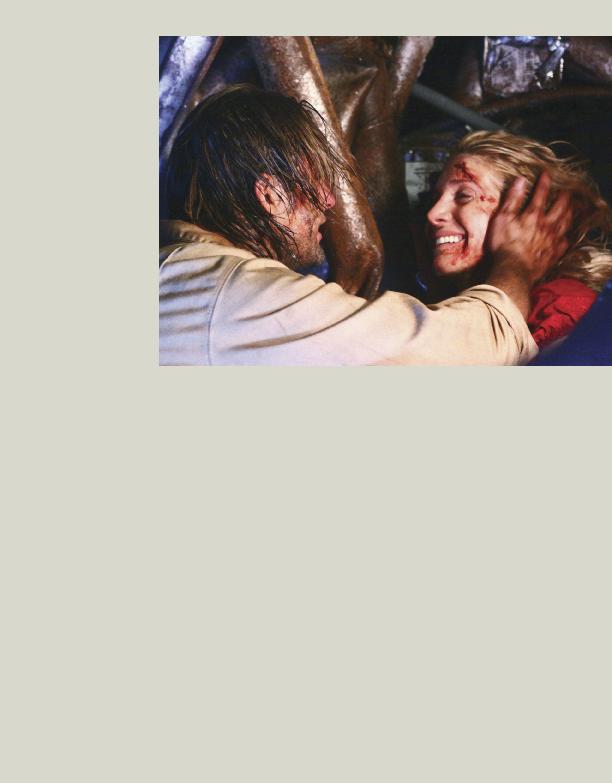
O'Quinn) is, in fact, the
smoke monster who has been
heard and glimpsed many
times since the pilot but until
this point had never been per-
sonified as a character. The
monster has become a major
character in the final season
with the confirmation that it's
not only intelligent, but it's
also the man in black (Titus
Welliver) seen in season five's
finale, "The Incident," and in
this season's "Ab Aeterno."
"The approach to a lot of
these mysteries from the
start," Horowitz says, "has
been [that] people are more
interesting than objects or
facts. I think making some-
thing a person allows you to
then make it a character,
which then allows you to
make it something the audi-
ence can get invested in." He
and Kitsis confirm this decep-
tion by the false Locke has
been the plan since the mur-
dered man first reappeared alive on the is-
land in season five's "The Life and Death of
Jeremy Bentham."
peared more as the show progressed: the
stone lighthouse, with its elaborate gears and
mirrors; the hidden passages of the Temple;
and, of course, the infamous glowing don-
key wheel that moves the island through
space and time. "We spend a large amount
of time involving the technical aspects as
well as the story aspects," Horowitz says.
"And Carlton, God bless him, is one hell of
a sketch artist." It's not uncommon for ex-
tensive diagrams to be drawn on the white-
boards with hours spent discussing the actual
mechanics behind story elements.
land or its mysterious master, Jacob (Mark
Pellegrino), need a gear-driven, mathemati-
cally precise lighthouse when the end result
is magic? "I think because it's too easy," Kit-
sis muses. He points out the show works best
when things are left in the gray areas of "is it
or isn't it?" and mysteries that could have
scientific or supernatural answers are posed.
hate the magic, and there are people who
love [the magic]," he says. "For us, we don't
want to come down either way. There's defi-
nitely some magic in the show but there's
definitely some science. That's a huge theme
in the show -- man of science versus man of
faith. Things like a donkey wheel that needs
to be turned illustrate that."
the time travel, which dominated season
five. While fans tirelessly debate the finer el-
ements of time travel -- both online and
over a beer -- it should be noted that the
show's producers debate it as well. The show
first toyed with time travel in the fourth sea-
son episode "The Constant," where a funda-
mental rule for the show was formed. "We
don't do paradoxical storytelling," Lindelof
says. "We're more interested in the story-
telling where you travel to a future and
there's nothing you can do to stop it from hap-
pening. In fact, the more you try to avert it
from happening, the more you might po-
tentially be the cause of that disaster." Cuse
adds that it's difficult to have stakes if the fu-
ture is always alterable, because there are no
real consequences. Horowitz points out that
it's illogical to make something happen in
Kitsis, however, is a firm believer in, "Back to
the Future time travel," and claims an unal-
terable history means a dull time travel story.
"You hear those arguments on the show be-
cause those are arguments in the room," he
says with a chuckle.
right from the start, allowing people to get
drawn in instead by the characters and the
drama of the plane crash. "There's obviously
this loud, menacing monster out in the jun-
gle," he says, "but you never see it. So for
those people who don't want to be watching
a science fiction show, like a Rorschach test,
they project. Whatever it is that threw the
pilot up into that tree, there's got to be a ra-
tional explanation. Even when they saw
`Walkabout,' they say, `I don't know how
Locke ended up in the wheelchair, so maybe
it was psychosomatic and the plane crash
jarred his memory free.'" He mentions shows
such as Heroes or the short-lived LOST-coat-
tails show, Invasion, which both opened with
sci-fi events rather than letting people slowly
come to their own conclusions while they
became invested in the characters. "If you
watch the pilot for Heroes and Nathan Pe-
trelli flies up into the sky and catches Peter